From Philadelphia to the Front Lines: Letters from World War II
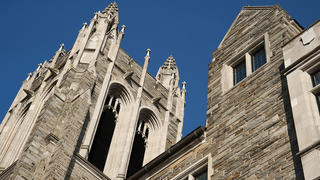
Editor's note: This article was written prior to University of the Sciences' merger with and into Saint Joseph's University and does not reflect the current, combined institution. References to programs, offices, colleges, employees, etc., may be historical information.
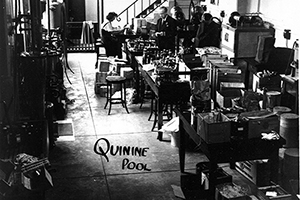 Hundreds of students and alumni from Philadelphia College of Pharmacy and Science were compelled to enter the armed services during World War II. But back in Philadelphia, John E. Kramer PhG’25 sought to preserve their wartime stories and the role that the institution played in the war.
Hundreds of students and alumni from Philadelphia College of Pharmacy and Science were compelled to enter the armed services during World War II. But back in Philadelphia, John E. Kramer PhG’25 sought to preserve their wartime stories and the role that the institution played in the war.
Kramer, the registrar, assumed the task of filing the names of the enlisted, military addresses, photos, and correspondence. It was said that Kramer replied to every letter and helped to share articles about those in service in the Bulletin. Were it not for his foresight and diligence, the stories of the great service of these men and women would have been untold.
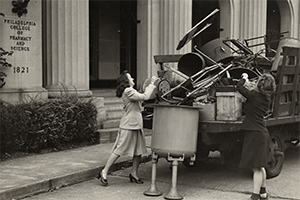 Frances F. Curran BSc’38, MSc’39, who held many positions and is noted as an institution in the grand tradition of PCPS, discovered Kramer’s loose-leaf notebooks full of correspondence in the College Archives and sought to preserve them, authoring a book “Keeping in Touch” in 1995.
Frances F. Curran BSc’38, MSc’39, who held many positions and is noted as an institution in the grand tradition of PCPS, discovered Kramer’s loose-leaf notebooks full of correspondence in the College Archives and sought to preserve them, authoring a book “Keeping in Touch” in 1995.
“Thirty men from the class of 1938 who entered the armed services were my classmates,” wrote Curran. “I became determined to let everyone know what PCPS contributed to the success of America in World War II.”
Kramer started correspondence shortly after the attack on Pearl Harbor to let servicemen and women know that the college cared for them.
“A stunned and sobered America heard again the hurried call to arms; everyone felt the impact,” wrote Ivor Griffith PD’1912, PhM’1921, ScD, FRSA, in a publication following the war. “Students from all classes set aside their workaday books and instruments and off they went to their chosen forces, some never again to tread the halls of their College.”
The college had some 543 alumni and 223 students scattered throughout the different war fronts from Iceland to Australia, Europe to Japan, and North Africa to the South Pacific. Many were enlisted as researchers, engineers, or in the hospital corps, however, some were on the front lines of combat. Eighteen were killed in action or died while in the service.
During the war enrollment in PCPS, which was normally nearly 500 students, dropped to less than 200 and women outnumbered men for the first time in history. PCPS offered accelerated classwork to educate students to fulfill Selective Service, evening classes for civilians to learn chemistry so that they could work in war industries, and first aid classes. A series of lectures were published in Popular Science to depict the role of science in the war. The college collected salvage and scrap metal to fill a national and military need and launched the Quainine Pool, which collected more than 30,000 ounces of the medication to give to the government to treat malaria.
The stories of the war are best told by those serving through their letters:
Martin Glickman
Student in Airforce
March 3, 1945
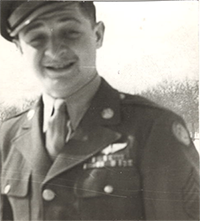 “I was a tail gunner in a Liberator bomber stationed in England. I have flown 35 missions over Germany and German-occupied Europe. My first mission was on D-Day. [...] We had an engine shot out over the target so we had to drop out of formation. A straggler is usually pounced upon by the enemy fighters and I assure you that we were really tense. Then out of the blue, eight fighters peeled off and came right for us. All guns in our plane swung around on the fighters and prepared to open up. Then the fighters flipped their wings and we saw they were American Mustangs. The signs of relief that went up could be heard ‘round the world.’ They came in flew formation with us and escorted us all the way to the base. We felt like kissing every one of the boys.”
“I was a tail gunner in a Liberator bomber stationed in England. I have flown 35 missions over Germany and German-occupied Europe. My first mission was on D-Day. [...] We had an engine shot out over the target so we had to drop out of formation. A straggler is usually pounced upon by the enemy fighters and I assure you that we were really tense. Then out of the blue, eight fighters peeled off and came right for us. All guns in our plane swung around on the fighters and prepared to open up. Then the fighters flipped their wings and we saw they were American Mustangs. The signs of relief that went up could be heard ‘round the world.’ They came in flew formation with us and escorted us all the way to the base. We felt like kissing every one of the boys.”
Leonard S. Greene P’42
Army
August 12, 1942, in Passau, Germany
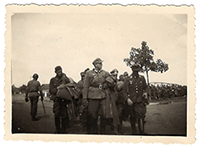 It has been quite some time since I’ve written but I must admit you are never far from my thoughts. Keeping up with the events and activities of the college has brushed away many a dreary hour and, at times, has taken my mind off the destruction, rot, and decay of my environment. I’m with a medical collecting company attached to the 406th Infantry Regiment of the 102nd Division... I had many an unforgettable experience. Some I want to forget.
It has been quite some time since I’ve written but I must admit you are never far from my thoughts. Keeping up with the events and activities of the college has brushed away many a dreary hour and, at times, has taken my mind off the destruction, rot, and decay of my environment. I’m with a medical collecting company attached to the 406th Infantry Regiment of the 102nd Division... I had many an unforgettable experience. Some I want to forget.
Our division spearheaded many attacks and had its share of casualties. The crossing of the Ruhr River was one of the most exciting experiences I’ve had... Things seemed to be fairly quiet that night. There was a full moon and clear winter sky. It wasn’t until we were on the bridge that planes came over. It seemed like ages before we crawled off the bridge. All hell broke loose, the sky was just a roof of AA fire and tracers...We left the Jeep and headed for a chateau about 100 yards from the road. We stayed there until the planes left. It wasn’t until several days later that I found out that the field we had crossed was mined. It took about eight hours to go 10 miles and before we had reached our destination we had three more attacks...
When I got in the army I was a little disappointed because I wasn’t put in a unit where I could exercise the skills I learned, but now I’m more gratified -- for myself and the men I work with.
… If I knew I had saved even one life, my efforts have not been in vain. Although we did have it rough, those infantry boys made us look and feel like we were rear echelon. There are no words to express the hell of fighting and living those boys went through and no glory is too great for them. They are the best of this and every war. We’ve seen them come in with horrible and extremely painful wounds and I’ve yet to hear the first cry in pain. It is amazing what they allow themselves to suffer in silence. Thank God it’s all over.
Joseph James Chally P’48
Student in Army
Remembrance of his time serving in the medic unit during D-day
“In March 1944 we docked at Liverpool [...] then sent to Llandudno in Wales where we trained intensively most as medical and surgical technicians. The entire unit was sent to Bristol, England and the 117th General Hospital was ‘born’ and not a day too soon. Casualties from the invasion of Normandy in 1944 began arriving. Severely wounded GIs came from trains, planes, and ships to Bristol and soon the hospital was filled beyond capacity. It was then that we appreciated the reason for the long hours of training. After seeing the wounded came back from the battlefields, no task was too small or too hard.”
